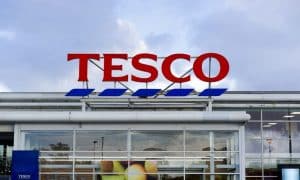Tesco links supplier financial support to environmental goals
Tesco is offering preferential financing rates for suppliers that address their environmental impacts under a new voluntary programme supported by Anthesis, KPMG and Santander.

Suppliers that lead on decarbonisation will be offered preferential financing rates via Santander.
Tesco’s chief product officer Ashwin Prasad said: “In this critical year for climate action, we’re delighted to be able to offer thousands of suppliers access to market-leading supply chain finance linked to sustainability.
“This programme not only provides suppliers with a real incentive to set science-based emissions reduction targets, it will help embed sustainability goals throughout our supply chain and support the UK in realising its climate change targets.”
The initiative builds on the Tesco Supplier Network, an online platform giving more than 10,000 suppliers guidance on improving sustainability.
Last year, Tesco spearheaded a call to action involving 160 of the world’s leading food companies to end deforestation arising from soy farming in the Cerrado Savannah. In 2018, a string of big-name investment corporations, including Legal and General Investment Management (LGIM), APG and Robeco, joined dozens of large corporate buyers such as Unilever, Tesco, Marks and Spencer (M&S) in signing the Cerrado Manifesto to protect the area from biodiversity loss.
Sustainable travel in Norway
It’s one thing for a business to call its operations sustainable, but quite another for them to prove it. Norway has long been a “sustainability trailblazer,” according to Stockholm-based travel consultant Neil Rogers. He told Outside that it’s because most Norwegians live close to nature: “They appreciate and care about the places they recreate in and understand that they must rapidly take actions to protect and conserve their environment and culture.”

Norway has established a range of certifications to help consumers distinguish between those who talk and those who do. Innovation Norway, which sits above the destination company Visit Norway, outlined 10 principles of sustainable tourism based on the conservation of nature, the environment and culture.
In 2013, Norway established a Sustainable Destination standard that measures more than 104 indicators covering nature, culture, environment, social values, community involvement and economic viability. Operators can apply for the Ecotourism Norway certification, while hotels and other enterprises can shoot for Eco-Lighthouse status to document their environmental efforts.
Gen Z Is Emerging As The Sustainability Generation
According to a recent study, Gen Z Shoppers Demand Sustainable Retail, the vast majority of Generation Z shoppers prefer to buy sustainable brands. They are most willing to spend 10 per cent more on sustainable products.

The report also found that Generation Z and Millennials are the most likely to make purchase decisions based on values and principles (personal, social, and environmental).
A survey last year by DoSomething, a social impact consultancy, reported that 75 per cent of Gen Z respondents said they wanted to see that brands were ensuring employee and consumer safety. The survey found that “If [brands] are not authentic, Gen Z will be the first to raise a red flag.”
Virtually every company now proclaims its devotion to sustainability. But being authentic is not so easy, and those who market around sustainability without backing it up run the significant risk of alienating consumers with messages that come across as self-serving.
Tune in next week for another round of sustainability news from around the globe.


